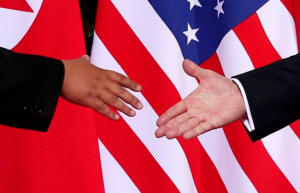|
Trump expected to tout North Korea
progress, but concrete moves lacking
 Send a link to a friend
Send a link to a friend
 [September 24, 2018]
By David Brunnstrom and Matt Spetalnick [September 24, 2018]
By David Brunnstrom and Matt Spetalnick
UNITED NATIONS/WASHINGTON (Reuters) - A
year after Donald Trump threatened to "totally destroy" North Korea in
his first speech at the United Nations, the U.S. president will return
to the podium in New York this week to tout diplomatic efforts that have
reduced the risk of war.
But even if Trump's rhetoric at the annual United Nations General
Assembly is expected to differ sharply from his 2017 address in which he
mocked North Korean leader Kim Jong Un as "Rocket Man" on a "suicide
mission," some U.S. officials and analysts say Pyongyang has yet to take
concrete measures to show it is prepared to give up a nuclear arsenal
that threatens the United States.
The change of mood was sealed when Trump and Kim met for an
unprecedented summit on June 12 in Singapore, and in the past week, the
North Korean leader promised South Korean President Moon Jae-in to
dismantle a missile site and also a nuclear complex - if the United
States takes "corresponding action."
While appearing to set a positive tone, the commitments fell far short
of Washington's demands for a complete inventory of North Korea's
weapons programs and irreversible steps towards denuclearization.

Trump is to meet Moon on Monday to get a first-hand account of the
Korean summit before delivering his U.N. address on Tuesday.
U.S. Secretary of State Mike Pompeo, meanwhile, has proposed a meeting
with his North Korean counterpart, Foreign Minister Ri Yong Ho, and
plans to chair a Security Council meeting on the denuclearization effort
on Thursday.
Some U.S. officials are concerned Trump is taking an overly rosy view of
North Korea developments.
Trump called last week's joint declaration by Moon and Kim "very
exciting" and has previously said he is willing to meet Kim a second
time, in spite of a lack of obvious progress from their first meeting in
Singapore.
One U.S. official, speaking on condition of anonymity, said the worry
was Trump might offer Kim "too much too soon" to score a win ahead of
the Nov. 6 congressional elections, which will decide whether Trump's
Republican Party maintains control of Congress.
POMPEO SAYS STILL WORK TO DO
While declaring the developments in the Koreas summit sufficient to
allow a restart of high-level talks with North Korea, Pompeo's tone has
been more measured.
In television interviews on Friday, he said there was still work to do
"to make sure conditions are right" for a second summit and reiterated
that sanctions would have to remain on North Korea until it gives up its
nuclear weapons.
[to top of second column]
|

President Donald Trump shakes hands with North Korean leader Kim
Jong Un at the Capella Hotel on Sentosa island in Singapore June 12,
2018. REUTERS/Jonathan Ernst/File Photo

Past U.S. insistence that North Korea act first before expecting any
easing of sanctions or a formal end to the 1950-53 Korea War over
have not gone down well with Pyongyang.
Pompeo's proposed interlocutor in New York, Foreign Minister Ri,
responded to Trump's U.N. remarks last year by calling them "the
sound of a dog barking" and warning that North Korea could detonate
a hydrogen bomb over the Pacific.
Soon after his summit with Kim, Trump declared the North Korean
nuclear threat over, despite little more than a broad pledge by Kim
to "work toward" denuclearization of the Korean peninsula.
"Trump will likely continue his practice of hailing even
insignificant North Korean steps as major advances," said Evans
Revere, a former U.S. negotiator with North Korea under the last
Republican president, George W. Bush.
"His approach, which I have dubbed 'strategic optimism', seems to
regard the appearance of denuclearization as more important than the
real thing, since the former is easier to achieve than the latter,"
he said.
Revere and other former officials and analysts said North Korea
seemed to have done little more so far than repackage past promises
broken in decades of failed talks.
However, Joseph Yun, who retired this year as U.S. envoy on North
Korea, said relations with Pyongyang were at least "materially
better" now the two sides were no longer trading threats and there
was a chance to make progress.
"Are they going to completely denuclearize by January 2021?" Yun
said, referring to the end of Trump's current term that Pompeo has
set for this goal.
"No. It's going to take longer than that."
(Reporting by David Brunnstrom and Matt Spetalnick, additional
reoporting by John Walcott; Editing by Yara Bayoumy and Grant
McCool)
[© 2018 Thomson Reuters. All rights
reserved.]
Copyright 2018 Reuters. All rights reserved. This material may not be published,
broadcast, rewritten or redistributed.
Thompson Reuters is solely responsible for this content.
 |